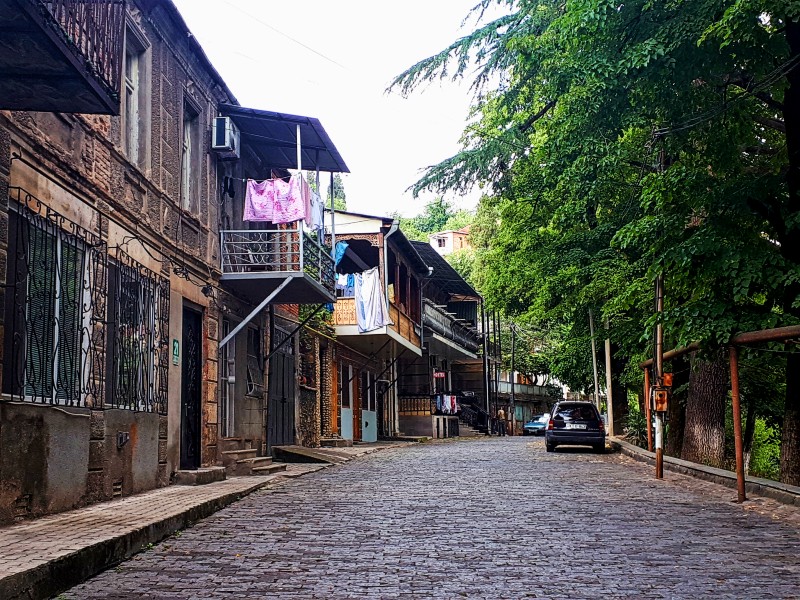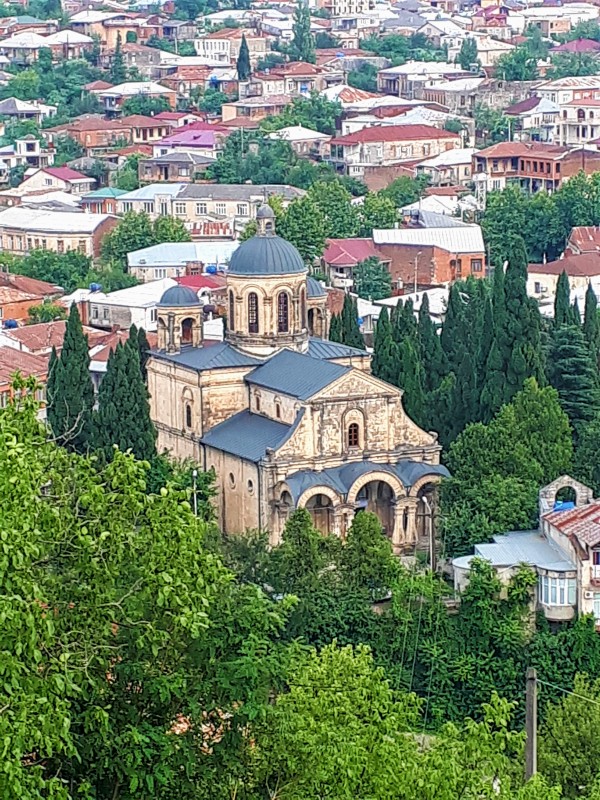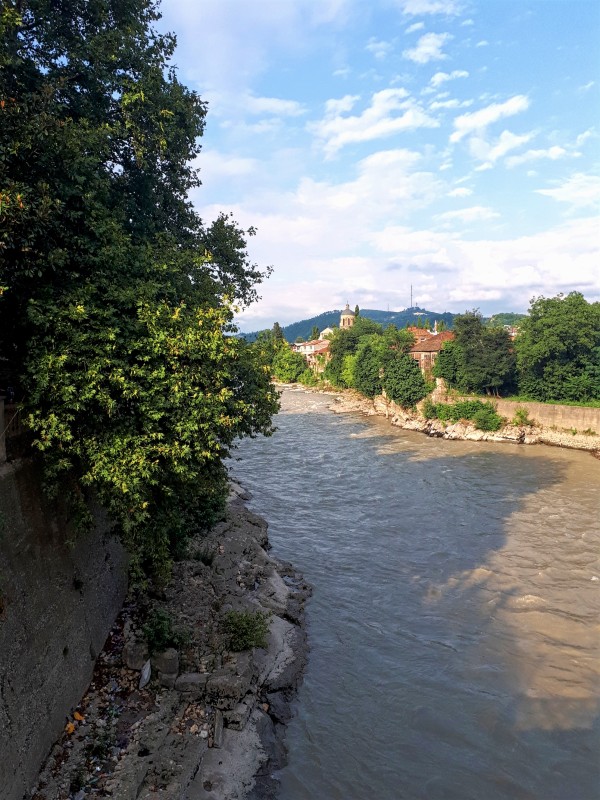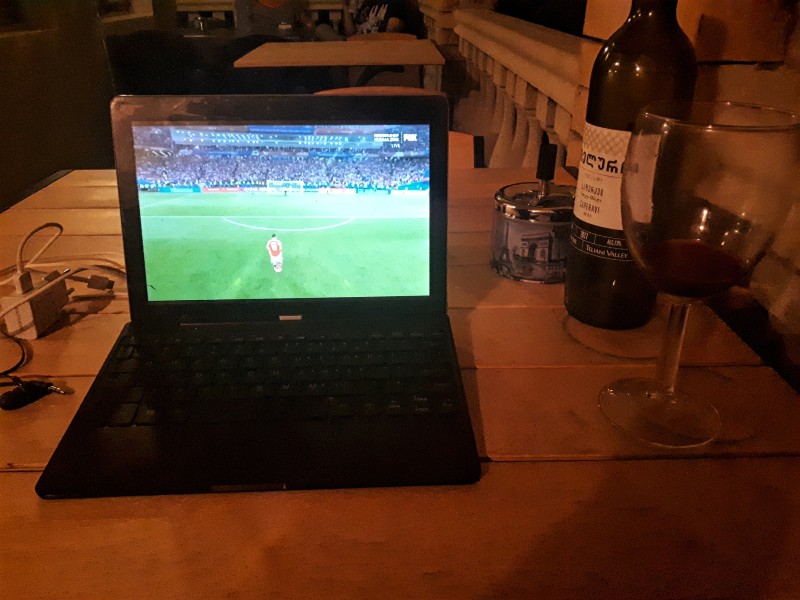A Day in Kutaisi, the Charming Capital of Imereti
In this destination trip report we spend a day in Kutaisi, the capital of the Georgian region of Imereti and the third largest city in Georgia.
Into the city
After an uneventful Wizz Air flight from Bucharest to Kutaisi, I was picked up from the local airport by the friendly owner of the Sanapiro Hotel for my pre-arranged transport.
It was a fun 40-minute drive into town talking with the owner and one of his friends seated next to him in the passenger seat.
As both of them were very talkative and spoke fluent English, it was a good opportunity to catch up on recent Georgian events and the state of tourism in the country as my last visit to the Caucasian republic had already been a couple of years back.
The Sanapiro Hotel, a family-run guesthouse a short walk away from Kutaisi’s city centre, did not disappoint as a budget choice.
My room was clean and the rate I paid (35 euro/night) included breakfast on the lovely covered terrace overlooking the Rioni River.




Kutaisi
Although Kutaisi is Georgia’s third biggest city (being recently overtaken by Batumi in size) it arguably still is the second most important city of the country in terms of tradition, culture and history.
Kutaisi is the legislative capital of Georgia since the parliament moved from the national capital of Tbilisi to a modern building on the outskirts of Kutaisi in 2012 in a bid to decentralise the government. It’s also the main city of Georgia’s Imereti region.
Despite Kutaisi’s importance, the city still has the feel of a provincial town, having a population of only 147,635 inhabitants
I’ve visited Kutaisi before some 7 years ago and as I did enjoy the relaxed vibe in this low-key city back then, I certainly did not mind stopping here again.
There is enough to see in Kutaisi to spend a day in town at a leisurely pace.
A couple of kilometres outside of Kutaisi, there are also some interesting sights such as the famous UNESCO-listed monasteries of Motsameta and Gelati as well as some beautiful caves (Sapatlia and Promotheus).
I will detail my visit to these places in the next chapter.


Colchis
Kutaisi is one of the world’s oldest continuously inhabited cities, with there being archaeological evidence of the city being populated since the 6th Century BC.
The city of Kutaisi was the capital of the ancient Kingdom of Colchis – and it is believed that Kutaisi was the final destination for Jason and the Argonauts in their quest to find the Golden Fleece, which was kept here by King Aeëtes.
The Colchis Fountain, located in the middle of a roundabout in front of the Meskhishvili Theatre, was built as a tribute to Kutaisi’s ancient history and features several golden statues depicting historical Georgian figures.


Bagrati Cathedral
Although Kutaisi certainly has a long history, there aren’t actually that many old sights to see in town.
One major exception is the hilltop Bagrati Cathedral, which dates from the 11th Century and is a prime example of Medieval Georgian architecture.
It’s an easy climb up from Kutaisi’s centre to the Cathedral. The walk up to the cathedral takes you along St. George’s Church and through some particularly scenic streets lined by old houses with traditional Georgian balconies.
When I last visited Kutaisi, Bagrati Cathedral was still partly in ruins and in the progress of being renovated.
The renovation was certainly controversial, as conservationists complained that the planned renovation would affect the cathedral’s structural integrity and authenticity.
The authorities however pressed on with the renovation, which prompted UNESCO to remove Bagrati Cathedral from the World Heritage List due to irreversible damage done to the building’s authenticity.
That said, the Cathedral is still a beautiful sight to visit and there are wonderful views over Kutaisi from the hill.






Market
From the cathedral I headed back downhill again for a leisurely walk in the downtown area.
As I wrote before, there isn’t really a lot to see in Kutaisi but the town has a decidedly relaxed vibe which makes walking around a pleasure.
Especially the area around the Green Bazaar is great for people watching and soaking up the local atmosphere.
Make sure you check out the lovely relief at the side of the main market building!







Khachapuri and wine
As I had skipped lunch altogether I was getting quite hungry.
When I saw a cool-looking place with some nice outdoor seating (Wine Bar Sapere) I decided to sit down for a bite and some wine.
After all, visiting Georgia is as much about the great food and booze as it is about seeing the sights!
Georgia is the cradle of wine and archaeologists generally are in agreement that the first ever wines were made here.
Traditionally, wines were made in large clay pots which when then buried inside the garden to ferment and some locals and a select few wineries still make wine in the exact same way to this date!
There are some intriguing local grape varieties and excellent wines to be found all across Georgia, although the most famous wine-producing region (Kakheti) is found in the east of the country.
Georgia’s most famous food is the khachapuri – which basically is cheese bread – and each region makes this staple of Georgian cuisine in their own style.
The most ubiquitous khachapuri you will find around Georgia is the Imeretian variety which originally comes from this part of the country.
The Imeretian khachapuri (also called Imeruli khachapuri) is basically a bread infused with yeast and some salty cheese (most often a mixture of local Imeruli cheese and Sulguni cheese).
Other common khachapuri varieties are the Adjaran khachapuri (an open, boat-shaped khachapuri with egg yolk and butter in the middle) and Megrelian khachapuri (similar to the Imeretian khachapuri but with an extra layer of cheese baked on top).


Dinner
Being in Kutaisi, I of course had to order some Imeruli khachapuri, which I washed away with some excellent local red wine.
The food at Wine Bar Sapere was served with a complimentary bottle of mint-infused waster, which certainly was refreshing on this hot summer day!
As a main, I had some grilled meat from the barbecue – it was nicely presented with onions and pomegranate seeds but unfortunately it was a bit blackened and overcooked for my taste.
The dessert was however much better and was just as excellent as the Imeruli khachapuri I had as starter.




Mineral water
After the meal, I wandered a bit more around Kutaisi’s city centre with its cobblestoned streets and alleys and stopped at a café for an after-dinner coffee.
Another Georgian culinary treat is Borjomi mineral water, which I ordered with my coffee. Borjomi is an acquired taste as the water is highly carbonated and has a peculiar aroma of volcanic minerals.
Nabeghlavi, another popular Georgian mineral water, is similar in taste to Borjomi but isn’t as sulphuric.
When I first drank Borjomi I didn’t like the drink, but the taste of the mineral water certainly grew on me over the last years and I now consider myself a big fan of it.
I always order it when travelling in Georgia or in any other former Soviet country where the drink still is popular too.
Borjomi was by the way also the favourite drink of a certain Georgian born under the name of Ioseb Besarionis Jughashvili (but better known under the pseudonym of Stalin), so anyone who dares to disagrees with me on the great taste of this mineral water will see themselves locked up in a gulag.
Afterwards, I headed back to the hotel to watch the Croatia vs. Russia World Cup football match on my laptop from the lovely hotel terrace while enjoying some more Georgian wine, with the Croatians eventually beating the Russians after penalty kicks.



Conclusion
Even though Kutaisi lacks the sights of the Georgian capital of Tbilisi and doesn’t have the Black Sea backdrop of Batumi, it still makes for a nice city to visit.
If you happen to fly into Georgia on a low-cost airline like Wizz Air (like I did) through the local airport, Kutaisi makes for a relaxing introduction to the country.
As Kutaisi is conveniently located halfway between Batumi and Tbilisi, most other travellers to Georgia are likely to pass through the city as well, and there are some good reasons why you should spend at least a night here.
Besides being a charming city in its own right, Kutaisi also has a lot to offer in its direct environment as there are several gorgeous monasteries and caves just outside the city limits.
Although Kutaisi is unlikely to be the highlight of your trip to Georgia given that the country has so many world-class sights and an amazing natural scenery, you won’t regret stopping here for a day if you have the time on your travel!
Trip report index
This article is part of the ‘Khachapuri & Kebabs: A Summer Trip to Georgia and Turkey‘ trip report, which consists of the following chapters:
1. Review: Wizz Air Bucharest to Kutaisi (Airbus A320)
2. A Day in Kutaisi, the Charming Capital of Imereti (current chapter)
3. Caves, Churches and Monasteries – A Kutaisi Day Trip
4. Review: My Warm Guest House, Batumi, Georgia
5. Beautiful Batumi – The Pearl of Georgia’s Black Sea Coast
6. From Georgia to Turkey: Batumi to Kars by Bus
7. Review: Kars Konak Hotel, Kars, Turkey
8. A Day Trip From Kars to the Ancient Armenian City of Ani
9. Goose, Cheese and Russian Remnants: A Visit to Kars, Turkey
10. Review: Dogu Express Night Train Kars to Ankara, Turkey
11. Review: AnadoluJet Ankara to Izmir (Boeing 737-800)
12. Review: Ege Palas Business Hotel, Izmir, Turkey
13. Izmir: Turkey’s Most Liberal and Liveable City
14. Ancient Ephesus: An Easy Day Trip From Izmir
15. A Visit to the Hilltop Wine Village of Sirince
16. A Beach Trip From Izmir to Cesme and Ilica
17. Foça: A Beautiful Seaside Town to Visit From Izmir
18. Flying Back Home With Atlasglobal and TAROM


Hello, people,
actually the city is nice and worth seeing as i’ve been there twice, first experience was good not as the last i had. I’ d sugeest you to stay in the centre as i did before. This time we stayed at a guest house on Debi Iskhnehlebi street and now i hate this city, because of some annormal georgian citizens and i know it’s not the whole city’s responsiblity but still fhis broke my heart and i’m ready to hate it because of beating up my boyfriend with stones. There is no moral, no humanity, some Kutaisi georgians are still living in the middle age.